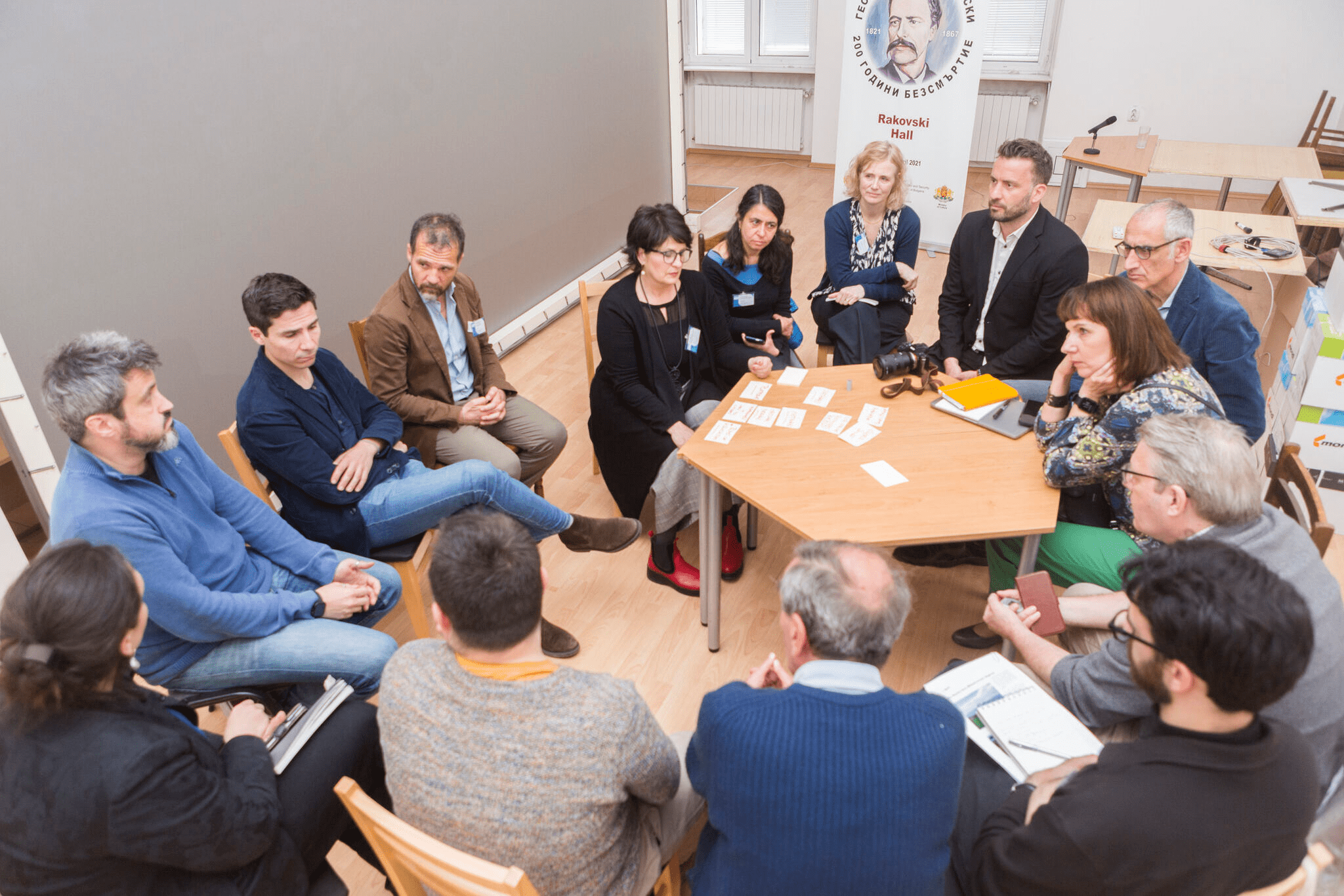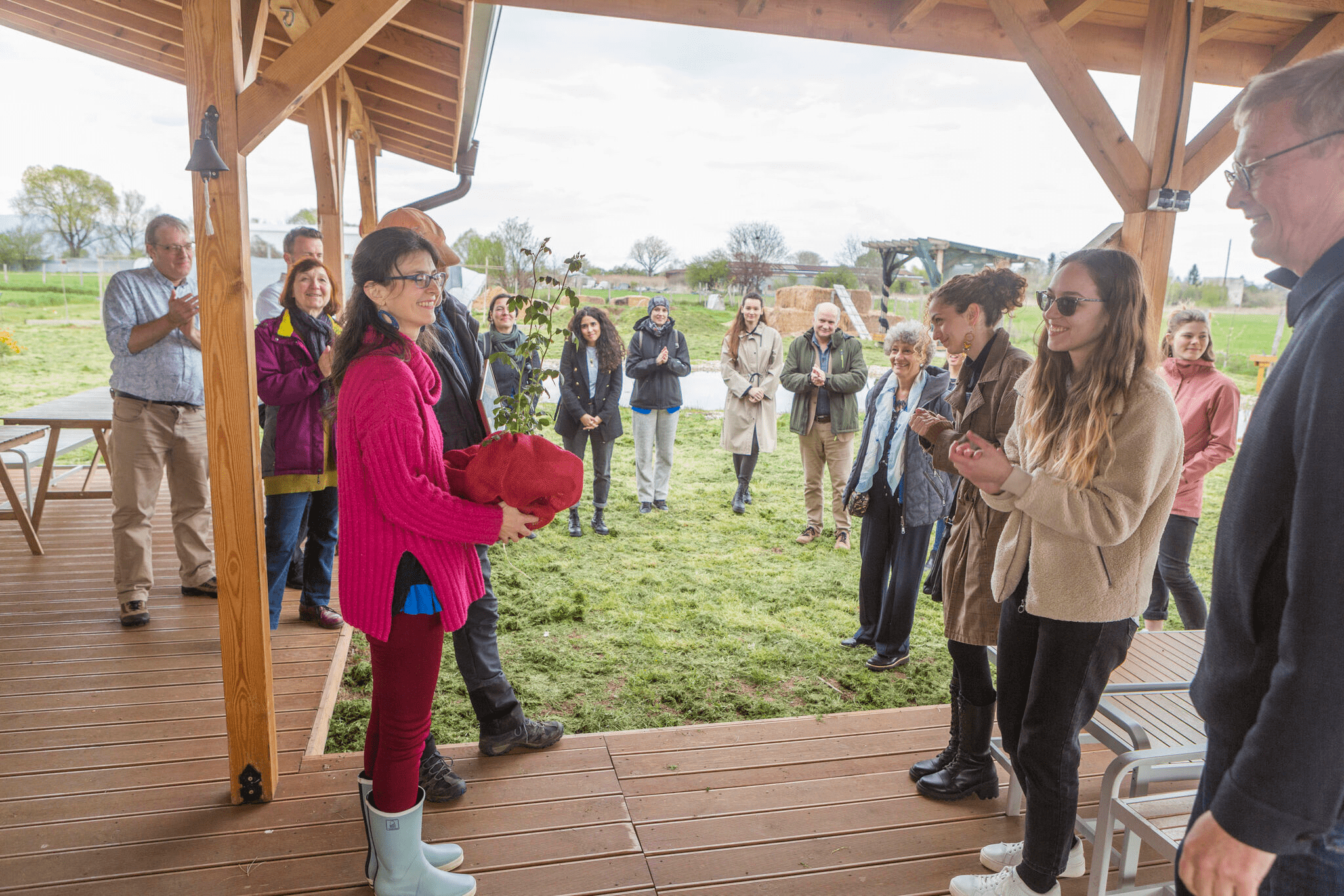Jun 6, 2023
The EFUA's Journey to Shape the Future of Food

The EFUA team gathering to discuss current issues facing the agricultural sector in the EU.
Written by: Niko Simos
June 6, 2023
EFUA, the European Forum on Agriculture, recently held its “NEXT” conference in the distinctive setting of the Military Academy in Sofia, the capital of Bulgaria. The event attracted a diverse array of participants from all over Europe and further afield, including a healthy contingent from North America. All shared a common interest, however, in putting urban agriculture (UA) firmly on the map, literally, but also in terms of the priority accorded to urban agriculture within European policies and programs, as well as recognition of the multiple benefits that UA provides.

EFUA conference attendees participate in a field visit to “Blizkata Ferma” on the outskirts of Sofia.
Indeed, “unlocking the potential of Urban Agriculture”, is very much at the heart of EFUA’s mission. The ambitious project was launched in 2020 as a consortium of 11 different organizations, following a successful application of the EUs Horizon 2020 Research and Innovation Programme. The members of the Consortium include leading universities, research institutes, farmers’ organizations, city representatives, and industry experts from around Europe. Together, this diverse mix of partners is working tirelessly to promote better policies, better networking, better deployment, and better knowledge in the field of urban agriculture and to thereby make UA part of the everyday lives of European citizens.
A significant challenge is to continue the work of EFUA well beyond the duration of the present EU-funded project by creating a long-term and sustainable UA Forum, which will be maintained and developed by its membership. EFUA is currently planting the seeds for this to occur by developing its extensive network of stakeholders.
EFUA Conferences
The EFUA conferences, held in Rome in 2022 and most recently in Sofia in May 2023, reflect the enthusiasm of the partners to break new ground, broaden their horizons, and seek new and innovative outcomes for UA. The recent Sofia conference was a huge success in this respect and created much in the way of healthy dialogue amongst participants during two days of intense activity.
Themes included:
Recent EFUA research: focusing upon the development of new UA typologies and the multifunctional benefits that the various types of UA provide.
Planning and policy guidelines: developed by EFUA through extensive surveys and consultation with city networks, stakeholder groups, and professionals in the field. These aim to provide helpful advice to practitioners in the field by using simple and effective language.
Guidelines for developing and maintaining commercial urban farming enterprises: through the role of mentoring organizations and progressive commercial consultancies such as Agritecture.

In this respect, EFUA believes that learning from real-life case studies and best practices is very much the way forward for building upon the current level of understanding and the capacity of UA to deliver results. With this aim in mind, EFUA has been busy collating a number of innovative case studies gathered from around Europe. These are extremely varied in their content, ranging from social enterprises and community gardens managed by volunteers through to commercial hi-tech vertical and rooftop farming models. However, all help to share a number of key messages from which we can learn and use to build a core of UA knowledge and expertise.
During the Sofia conference, participants had the opportunity to visit two diverse UA projects near the city. "Blizkata Ferma" is a family-run organic and regenerative farm specializing in direct sales and protecting the soil while providing healthy food. They also offer a children's program called "Muddy Adventures." Another project, "Food not Bombs," is a local collective providing vegan meals, medical support, and solidarity to homeless and disadvantaged individuals. These projects contrasted with hi-tech commercial urban agriculture, explored in a workshop hosted by Agritecture CEO, Henry Gordon Smith, who introduced the world's first commercial farm planning software, Agritecture Designer.
Check out the presentations from the Sofia “NEXT” Conference here.
EFUA and the Future

The diversity of UA, highlighted by these three examples is clearly one of its strengths, but at the same time, also one of the key challenges that EFUA and other organizations must be able to successfully address. UA is a relatively new concept which encompasses a huge range of different interests, from “hipster” urban gardeners who care passionately about the planet, to hard-nosed entrepreneurs struggling to build successful businesses in a challenging economic climate.
Uniting these diverse interests under one banner, to help stakeholders appreciate the common ground and to give participants the sense that they are part of a larger movement will be no simple feat. So, how can EFUA provide an umbrella for disparate interests, who might not necessarily feel they have much in common? The only way that this can happen is by picking out common threads and mutual concerns which unite the UA community and through providing a voice for the movement as a whole, that can then achieve tangible results for policy reform and action on the ground.

The EFUA would also like to broaden the partnership beyond the initial consortium members through attracting new organizations to participate in the Forum. Practically, this should include links to city networks, individual municipalities, and through attracting the interest and involvement of entrepreneurs and practitioners. By reaching out to a wider circle of stakeholders, EFUA can foster a culture of innovation within the network and create a welcoming environment where new ideas can flourish, supported by the right policies and incentives. To move this process forward, we must tell positive stories about innovation within the world of UA. These must resonate with a wider community, thereby engaging new audiences and enabling effective and inspiring discussion.
The consortium also needs to address the challenge of reaching out to policymakers at the highest level, both within the EU and other international institutions, to ensure that UA is not merely pigeonholed into one particular policy or thematic silo. The work of the EFUA has already shown that the benefits of UA cut across such traditional categories and indeed do deliver multiple social, environmental and economic objectives, including many of the UNs Sustainable Development Goals.
The EFUA community clearly has its work cut out in the coming years to ensure that the longer-term aspiration of “unlocking the potential of urban agriculture” is realized. To successful do that we must create a long term and enduring network of European partners, which brings all the relevant stakeholders into the fold and helps to create a collective and audible voice for UA.
Learn more about the EFUA on their website, or follow them on LinkedIn, Facebook, Twitter, and Instagram.
